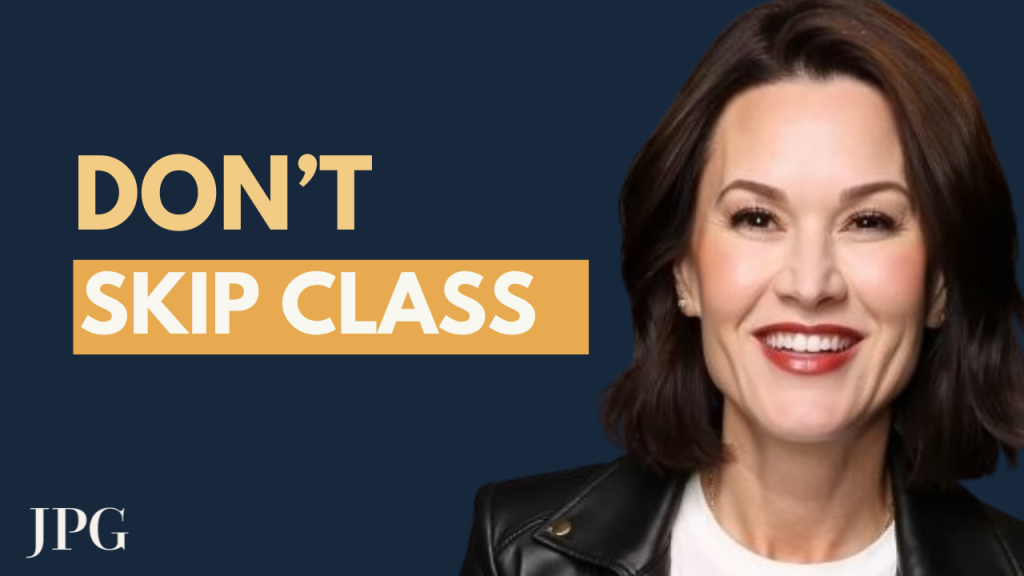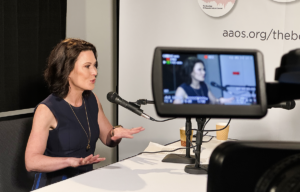Here’s What You (or Your Kids) Can Do to Build Executive Presence Starting in College
At JPG, we coach executives in their 40s, 50s, and 60s who are operating at the highest levels. These executives present to colleagues, board members, and industry panels, where they need to be viewed as knowledgeable and charismatic.
And do you know what many whisper to me right before I start preparing them?
“I wish I hadn’t skipped that presentation class in college.”
You’re reading that right. This starts early.
The self-doubt. The hesitation to present in front of others. The fear of messing up publicly. The fear of failure.
And now… it’s decades later and they wish they had worked on this skill sooner, because they’re playing expensive catch-up as senior executives.
The executives who command attention in boardrooms, influence policymakers, and inspire teams all share something in common. They didn’t wait until their first job to start building their speaking skills.
The truth is, your college years offer something you’ll never get again—a (relatively) consequence-free environment to experiment, fail, learn, and grow. Miss this window, and you could spend your career playing catch-up while your peers who maximized these opportunities are already influencing outcomes and advancing faster.
Here are the strategies to turn your college experience into a speaking success accelerator.
You Can’t Skip Presenting in Class
Every semester, the same scene plays out across college campuses. Students carefully craft their schedules with one primary goal: avoiding presentations at all costs. They’ll choose the professor known for only giving written exams, select classes that focus exclusively on individual projects, or even delay graduation to dodge that dreaded public speaking requirement.
This is perhaps the most expensive mistake you can make for your professional development.
Every time you avoid a presentation opportunity, you’re not just missing an assignment—you’re passing up leadership development that costs executives thousands of dollars to acquire later. I work with senior leaders who pay premium rates to develop the exact skills you can build for free in college classrooms.
The hidden cost of avoidance compounds quickly. Your first workplace presentation becomes trial by fire instead of natural progression. You miss four-plus years of low-stakes practice opportunities while your colleagues who embraced college speaking advance faster. Most damaging of all, you develop presentation anxiety instead of presentation confidence, which means your brilliant ideas get overlooked because you can’t articulate them effectively.
Your Presentation Strategy Playbook
In college, you get access to different presentation formats that mirror executive-level communication:
Solo presentations build individual confidence and personal brand recognition.
Group presentations develop collaborative leadership and consensus-building skills.
Impromptu speaking teaches quick thinking under pressure.
Q&A sessions master the art of graceful recovery and authentic expertise demonstration.
Network Like Your Future Depends on It (Because It Does)
Your dorm neighbor today could be your business partner tomorrow. Your study group member might offer you your dream job in five years. The debate team president could introduce you to the investor who funds your startup.
But here’s what most students miss entirely: Networking isn’t just about collecting contacts—it’s about practicing communication skills with different personality types in various professional contexts. Every club meeting, every event, every casual conversation becomes an opportunity to refine how you articulate ideas, build rapport, and influence outcomes.
The most strategic approach involves joining clubs aligned with your career goals while actively pursuing leadership positions. Business students should engage with entrepreneurship clubs, case competition teams, and business fraternities. Engineering students benefit from professional societies, robotics teams, and hackathons. Liberal arts students develop crucial skills through debate teams, Model UN, and student government participation.
Being Part of a Team Teaches You How to Be Coachable
The free-throw line with two seconds left. The serve at match point. The penalty kick with the championship on the line.
These moments teach you something no classroom can replicate: how to perform when it matters most.
When you commit to playing a team sport in college, you’re not just building physical fitness—you’re developing the psychological resilience and performance-under-pressure abilities that separate good speakers from great ones. The feedback loop in sports provides immediate, honest assessment that accelerates growth. Your coach doesn’t sugarcoat performance critiques, and teammates don’t hesitate to point out when you’re not contributing effectively.
This environment teaches you to receive criticism constructively, implement changes quickly, and maintain confidence even when performance isn’t perfect. These skills transfer seamlessly to professional environments where you need to handle challenging questions, adapt presentations based on audience feedback, and recover gracefully from mistakes.
The Communication Skills Hidden in Competition
The athletic mindset toward improvement—analyzing performance, accepting coaching, and persistently working on weaknesses—creates the foundation for lifelong communication skill development.
Pre-presentation nerves get managed like pre-game butterflies.
Hostile audiences get handled like opposing team pressure.
Technical difficulties get adapted to like equipment malfunctions during competition.
Performance mistakes get recovered from like missed shots or dropped passes.
The Winning Mindset That Transforms Speakers
Your relationship with success and failure shows up in every presentation you give, every meeting you lead, and every conversation that could advance your career.
Students with winning mindsets don’t just perform better academically—they develop the confidence and resilience that make them magnetic speakers throughout their careers. This mindset starts with reframing how you view challenges and setbacks. Instead of seeing difficult presentations as potential sources of embarrassment, view them as opportunities to develop skills that will serve you for decades.
The most effective approach involves setting specific, measurable speaking goals rather than hoping to simply “get through” presentations. Maybe you want to maintain eye contact with audience members for 80% of your presentation time, or perhaps you’re working to eliminate filler words from five-minute segments. These measurable goals create accountability and provide clear markers of improvement.
Build Your Online Brand
Your digital presence speaks before you enter the room.
In today’s professional landscape, your online brand serves as a preview of your communication skills, thought leadership potential, and professional maturity. Employers, potential collaborators, and speaking opportunity organizers will evaluate your digital footprint long before they hear you speak in person.
LinkedIn becomes your most important professional platform, but treating it like an online resume misses the opportunity entirely. Transform your profile into a communication showcase by optimizing your headline to highlight speaking-related achievements and developing expertise. Share insights from coursework and projects weekly, demonstrating your ability to distill complex concepts into valuable takeaways for professional audiences.
The content you create serves as speaking practice in written form. Blog posts teach you to organize complex ideas logically while LinkedIn articles help develop industry-relevant thought leadership. Social media threads force you to communicate concepts concisely, and guest posting opportunities help you adapt your voice for different audiences.
Your Speaking Success Starts Today
Sometimes the most powerful transformations come from small, strategic investments that start way before you need them.
The choice becomes clear when you understand the stakes: spend four years avoiding the discomfort of speaking opportunities, then scramble to catch up in your first job, or use these college years as your strategic advantage, building skills that will accelerate your career from day one.
Your future boardroom presentation that secures your promotion is being shaped by the decision you make today about that upcoming class presentation.
Ready to Transform Your Leadership Communication?
The executives who dominate boardrooms, influence billion-dollar decisions, and command standing ovations didn’t develop those skills by accident. They invested in expert coaching that transforms natural ability into magnetic presence.
At JPG, we’ve helped Fortune 500 leaders go from monotone presentations to spontaneous standing ovations. We’ve prepared rising executives for their first board presentations to global leadership teams. We’ve coached philanthropic leaders addressing diplomats at international events.
The difference between good leaders and unforgettable ones isn’t talent—it’s training.
Your competitors are already investing in executive presence coaching. The question is: will you let them gain the advantage, or will you claim your spot as the leader everyone remembers?
Whether you’re preparing for high-stakes investor meetings, board presentations, or media interviews where every word matters, we’ll help you command the room from the moment you speak.
Ready to discover what magnetic leadership looks like for your team?
Contact JPG today for a strategic consultation. Because the leaders who shape industries don’t leave their influence to chance.
Transform your experts into influential, magnetic leaders. The boardroom is waiting.
Schedule a consultation → At JPG, we’ll help you develop these skills — even if you skipped that class.





